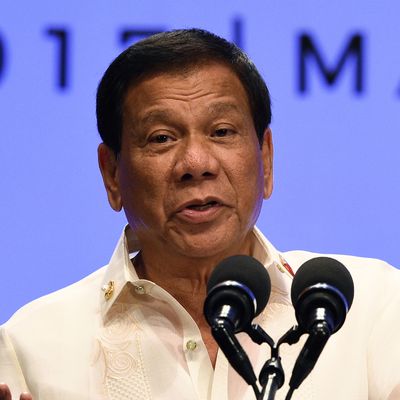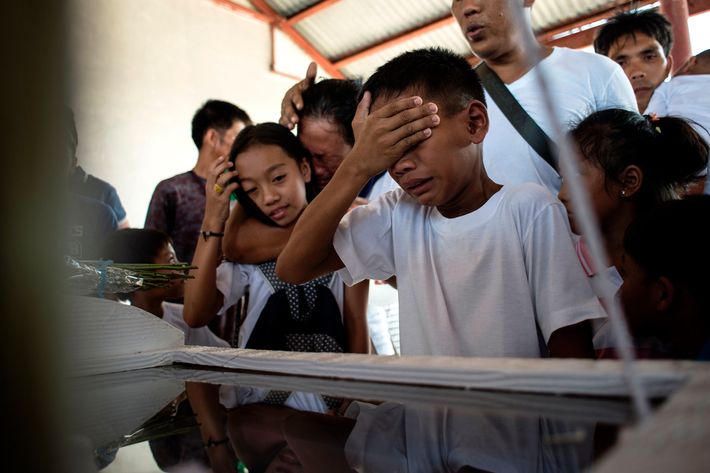
President Donald Trump invited the controversial populist president of the Philippines, Rodrigo Duterte, to the White House during a “very friendly” phone call on Saturday. Duterte has become internationally notorious for his use of state-sanctioned death squads and vigilantism as part of the Philippines’ war on drugs — a widely condemned extrajudicial campaign which has resulted in the murders of thousands of drug suspects in less than a year. Duterte also called former president Barack Obama a “son of a whore” and told him to “go to hell” last year after Obama raised questions about the anti-drug bloodshed, prompting the Obama administration to cancel a planned meeting between the two leaders during Obama’s trip to Asia in September. Now, thanks to Trump, Duterte has an official invitation to the White House.
During the phone call, Trump and Duterte “discussed the fact that the Philippines is fighting very hard to rid its country of drugs”; the North Korea crisis; and “the importance of the United States–Philippines alliance, which is now heading in a very positive direction,” according to the White House. Trump apparently “enjoyed the conversation” and offered to host Duterte at the White House at some undetermined point in the future. Trump also told Duterte that he looked forward to visiting the Philippines in November during a planned trip to Asia.
On Sunday, the New York Times reported that Trump’s invitation was news to both his National Security Council and the State Department, where officials are now preparing for an onslaught of criticism from human-rights groups. In other words, once again, Trump seems to have made a decision with complicated diplomatic consequences without first consulting the people in his administration who understand foreign affairs and whose job it is to advise him. The Times also reports that two administration officials — unnamed, as always — expect both the State Department and the NSC to raise objections internally, though it remains to be seen if they will have an effect on Trump’s decision after the fact.
Trump’s call with Duterte was apparently one of several arranged in order to reconnect with Southeast Asian leaders who were feeling neglected while the Trump administration has remained focused on the North Korea crisis. White House Chief of Staff Reince Priebus, appearing on ABC’s This Week on Sunday, said that the burgeoning relationship with Duterte was more about cooperating against North Korea than an indication that the Trump administration does not care about human rights. Priebus additionally claimed that the issue of human rights “stands very high at the top of the list” of the White House’s priorities, citing President Trump’s recent military retaliation against the Assad regime in Syria over its use of chemical weapons as an example of that commitment. On the other hand, if Duterte weren’t a head of state, it’s possible he wouldn’t even be granted a visa to enter the U.S., on account of the accusations of human-rights abuses made against him.
Trump, who has repeatedly shown an affinity for authoritarian world leaders, spoke with Duterte once before, in December. Trump reportedly praised Duterte’s war on drugs at that time, telling him that he thought Duterte was dealing with the problem in the “right way” and wishing the campaign “continued success.” Trump apparently offered a White House invitation then as well, but his transition team confirmed neither the invite nor Trump’s praise of Duterte’s drug-war tactics. Now they have, from Saturday’s call.

Duterte’s use of extrajudicial violence has been condemned by human-rights groups and many world governments. More than an estimated 7,600 people have been killed by police and vigilantes in the Philippines as a result of Duterte’s brutal campaign against drug use, which he put in place after taking office last May. The dead include suspected drug dealers as well as an unknown number of innocent, mostly poor Filipinos, who have either been mistaken for criminals or simply caught up in the bloodshed. Duterte has also claimed that he himself has partaken in the killing of drug criminals, and has declared that he would be “happy to slaughter” the millions of drug addicts in the country — in an apparent endorsement of the tactics Hitler used in the Holocaust. (He later apologized to Jews for the Hitler reference.) In February, Duterte also said he was going to try to widen the drug war’s scope by lowering the age of criminal responsibility from 15 to 9 years old, meaning more children could be targeted by the violence if Duterte’s plan is approved the country’s congress.
“Although the traits of his personality likely make it impossible, Trump should be ashamed of himself,” John Sifton, the Asia advocacy director of Human Rights Watch, remarked to the Times regarding Duterte’s White House invitation. Sifton said that Trump “is now morally complicit” in the leader’s future crimes.
This post has been updated to include the news that Trump seems to not have consulted his advisers before offering the invitation, as well as Priebus’s remarks on Sunday.






























